#Dunning Kruger
Text
The Curse finale interpretation
Ash's ascent/death, parallels to pregnancy, and "lived experience" in The Curse
There was a parallel between the way nobody believed or understood Asher when he was stuck in the tree to the way that pregnant people are treated while they are in labor (or even how women are treated in medical settings in general)
Ash's ascent/death
Nobody would believe Ash (besides Whitney who witnessed him floating inside the house and Moses who saw Ash float up into the tree) that he couldn't come down. Everyone who sees him projects their own interpretation of Ash's experience and intentions.
Dougie thinks Ash is running from his responsibilities because Dougie's dad did the same, and (from Dougie's POV), some men panic or even run away from their responsibilities once their partner is in labor or gives birth.
The neighbors from the community think that Ash and Dougie must be filming something because that's is their experience with these outsiders; they are TV people and act strangely, which can be explained by assuming that any weird behavior is a part of making a TV show. This explanation is also the best that they have for how Ash could possibly defy physical law (because it really isn't reasonable to assume that he just is breaking physical law in some way).
Ash repeatedly tells them that he will fly up. He tries his best to explain what he is going through, and he isn't doing the best job, probably because he's extremely afraid that he might die. I repeatedly tells Dougie and the first responders what he needs from them, and nobody listens. They think that Ash is delusional and that everyone else has a better understanding of the situation and therefore know what to do.
Connection to pregnancy
I think some of Ash's experience can be seen as analogous to what pregnant women (and women in medical settings in general) experience. Historically, doctors have been male, and they obviously have never been pregnant or gone into labor, and studies show that even women healthcare providers dismiss women and minorities in medical settings (it has to do with socialized biases in everyone, which I will come back to).
These professionals often dismiss a pregnant person's self-report of needing help, and a CDC report shows that 1 in 5 women report medical mistreatment while giving birth:
Approximately one in five (20.4%) respondents reported experiencing at least one type of mistreatment. The most commonly reported experiences of mistreatment were being ignored by health care providers, having requests for help refused, or not responded to (9.7%); being shouted at or scolded by health care providers (6.7%); having their physical privacy violated (5.1%); and being threatened with withholding of treatment or being forced to accept treatment they did not want (4.6%).
The same report found that the poorer the woman or more marginalized her background, the more risk of facing mistreatment:
Overall, 28.9% of respondents reported experiencing at least one form of discrimination during maternity care (Table 3), with highest prevalences reported by Black (40.1%), multiracial (39.4%), and Hispanic (36.6%) respondents. Overall, the most commonly reported reasons for discrimination were age (10.1%), weight (9.7%), and income (6.5%); reasons varied by race and ethnicity.
Initially Whitney planned to go to what was implied to be a better hospital. It feels like the show maybe wanted the viewer to expect that Whitney would die due to being at a "poor" hospital (and maybe she did; the finale went no full magical realism, imo). Benny and Nathan probably expected that viewers would immediately think or even assume that this would happen (drawing from our own biases, even if they are informed by statistics), which makes me think that Ash's experience is analogous to pregnant peoples' medical mistreatment.
In these medical settings, doctors frequently ignore a pregnant person's self-reports or requests for help, and instead, the doctors and medical staff (regardless of gender) tend to think that they know better or that the pregnant person is delusional/hormonal/emotional/etc. They dismiss their lived experience. Doctors have historically been male, so they have NO experience being pregnant, but they think they know better than the pregnant person, and even women who have been pregnant cannot speak for every woman. It is not rational to take your own experiences and extrapolate them to everyone else (which has been a common theme in the show: making assumptions based off of limited experience or socialized biases).
Like pregnant people facing medical mistreatment, Ash was ignored by health care providers Dougie and First Responders, had requests for help refused, or not responded to; he was shouted at or scolded by health care providers Dougie for running from responsibilities of becoming a father; and had treatment withheld (the anchored net that he repeatedly begged for) and was forced to accept treatment they did not want (tree branch cut off, sending him to his death).
Lived experience, hermeneutical gaps, and epistemic injustice
OKAY. So this comes back to (what I have taken to be) the overall recurrent theme of The Curse: lived experience, hermeneutical gaps/injustice, and testimonial injustice (which are forms of epistemic injustice, for anyone who is interested in learning more about this).
Hermeneutical gaps occur when a person or group lacks the concepts or terminology to describe their experience. Such gaps lead to hermeneutical injustice; Miranda Fricker describes hermeneutical injustice as occurring
when a gap in collective interpretive resources puts someone at an unfair disadvantage when it comes to making sense of their social experiences. An example of the first might be that the police do not believe you because you are black; an example of the second might be that you suffer sexual harassment in a culture that still lacks that critical concept . . . hermeneutical injustice is caused by structural prejudice in the economy of collective hermeneutical resources.
Before the term 'sexual harassment' came to be, people impacted by such harassment didn't have the concepts or terminology to be able to describe their experience or what they were going through; they were often dismissed as just being flirted with or they didn't even discuss their experience because even though the felt like something was wrong, they didn't have the concepts to articulate their experience, particularly to groups who do not have such experiences.
Here, Fricker describes hermeneutical injustice as:
. . . someone has a significant area of their social experience obscured from understanding owing to prejudicial flaws in shared resources for social interpretation . . . The wrong is analysed in terms of a situated hermeneutical inequality: the prejudicial flaws in shared interpretive resources prevent the subject from making sense of an experience which it is strongly in her interests to render intelligible.
So hermeneutical gaps (lack of conceptual resources [words or formed concepts] to describe experience) lead to hermeneutical injustice (where a person's experience is misinterpreted in a way that leads to harm or testimonial injustice).
Testimonial injustice occurs when one party (person or group) dismisses the credibility of another group (basically treating the marginalized person as though they are not a true knower).
An example might be Fernando trying to be heard about his knowledge of the community violence. Whitney dismisses him, thinking that she knows more about systemic issues. Ash takes advantage of this kind of injustice when he tries to cover his lie that Abshir, Nala, and Hani live in transitional housing once they bought the property they live in. Whitney called out the inconsistency, and Ash decided to exploit the lack of credibility marginalized people are usually extended. He says something like "honestly I don't know with them they say one thing then another," implying that they are dishonest.
Connecting Ash's ascent/death and medical mistreatment of pregnant people with overall themes in The Curse
ANYWAY. Pregnant people in labor go through a unique experience, and sometimes they lack the concepts necessary to explain their experience in a way that medical professionals will "understand" or take seriously (hermeneutical gap leading to hermeneutical injustice). Further, medical professionals dismiss a pregnant person's testimony and treat them like they are not credible while the medical professionals work from their own assumptions or formal medical knowledge (testimonial injustice).
Asher does not have the concepts to describe what he's going through. Nobody has experienced what he experienced, and the experience is new to him, so he doesn't know how to convey what he experiences in a way that Dougie and First Responders will understand. Further, Dougie and the First Responders dismiss Ash's testimony and treats him like he's not credible while Dougie and the First Responders work from their own assumptions or ascriptions of Ash's intentions.
Throughout the show, our main characters have made assumptions about poor people, natives, and their own employees. Many of these assumptions arise out of dismissing or discrediting the experiences of others in favor of their own interpretation of events or others' intentions. Whitney (and Ash) thinks she knows what's best for Las Espanola, even though she lacks the lived experience or even the proper educational experience to understand the complex nature of amending systemic injustice. She is like the medical professionals and First Responders who do not listen to the lived experiences (self-reports) of what people want or need.
This behavior necessarily implies that the people she's helping don't know what's best for themselves, which implies that Whitney has some kind of expertise that qualifies her to intervene on their behalf. She actually doesn't; she has no qualification other than she happens to have rich parents, which doesn't really qualify a person for any kind of job, especially one as complicated as amending economic or social injustice.
I didn't expect there to be growth on behalf of the characters (largely because people have pointed out that Safdie brother projects rarely involve any kind of meaningful growth or resolution; they have bleak outcomes), but in the finale, I thought that Whitney (and Ash) had grown. She expresses jealousy and bitterness that Cara was receiving national attention for leaving the art scene while her and Ash's show wasn't even aired; it ended up being direct to app content. She uncharitably criticizes Cara for disliking exploitive collectors, and Whit says that she thinks that Cara quit because no one bought her work. Ash jokes that maybe if Whit quits her project to work in a massage parlor, maybe people will write about her too. Whit bitterly jokes back that she would need some kind of cultural sob story like saying she was making a statement on the Holocaust. Ash says he knows that she's making joke that selling her art retraumatized her but goes on to point out that native people have gone through a lot, which he says that he fully understands where Cara is coming from and that people process tragedy in their own way (discussing Mel Brooks), and Whitney finally concedes that she probably shouldn't be talking the way she is and that she doesn't have that lived experience. He assures her that he considers her Jewish (and that she can make such jokes), but I think the takeaway is that—on some level—Whitney has gained some self-awareness and realizes that her experiences shouldn't inform the way she interprets other peoples' choices and intentions.
The concepts I discussed here might also be connected to the Dunning-Kruger Effect, which is the phenomenon that people (at any level of intelligence or education) learn something and think that they have a better understanding of what is going on than they actually do. When people (like Whitney) decide to act on such false assumptions of self-evaluation, they are likely to make mistakes or perpetuate injustice.
tldr; the real curse (imo) is the insidious implicit biases that are socialized into us and lead us to making assumptions about others' experiences and intentions. These assumptions ultimately create barriers that limit social understanding and social progress. If we all take a moment to examine why we reasoned as we do or where we get our ideas about people who don't share our ethnic, economic, gendered, religious, etc. background, we might find that we are missing the necessary lived experience (a hermeneutical gap) to understand where they might be coming from. Instead of assuming intent or competency or dismissing or being suspicious, we should all charitably interpret others to try to assume the best in and most of other people. It is what we would want others to do for us. Performing this kind of empathy will ultimately lead to developing the necessary empathy to overcome such biases by habit alone, which will create a more compassionate, empathetic, and understanding world, while also deepening and enriching our own lives and the lives of others by celebrating our plurality.
When we allow certain ideas into our head, they become very real to us, and when we act on those ideas without examining them carefully, those false beliefs can cause real harm.
#the curse#nathan fielder#benny safdie#emma stone#a24#showtime#epistemic injustice#hermeneutical gap#hermeneutical injustice#lived experience#spoilers#the curse explained#the curse finale explained#green queen#the curse s1e10#implicit bias#cognitive bias#dunning kruger
72 notes
·
View notes
Text

— @mlembug
For those too lazy to find the A3X GitHub repo and from there the archived forum thread that spawned it, here's some of my personal favorite moments.
Oh my god, I'm considered a noob in these parts and even I know you're an idiot.
Why do you keep referring to the Virtual Console? AFAIK, they work exactly like any other emulator internally.
I don't think you understand how intensive a "megahertz" is.
And now I sit down with a glass of fine wine in front of a fire to read this thread.
Congratulations, you just defined "program"
Well, for programs without conditional branching.
Sora reminds me of physics lectures I went to that started off "Assume a horse running on a racetrack is a block of uniform density sliding along a frictionless surface…"
Presumably it's a Hebrew idiom that just doesn't translate into English very well.
What math operation does PUSH represent?
Guys, guys….I think we're getting off track here.
Don't you all realise that it's all about TEH MATHZ?

I think his interesting idea is that bsnes should be implemented as a system of linear equations, rather than as an imperative sequence of instructions, and that will make it as fast as ZSNES. I'll give him credit, I've never heard that particular proposal before.
Excuse me, sir, I find this image HIGHLY OFFENSIVE! I think I speak for everybody present when I say that we use SQUARE pixels around these parts - maybe 8:7 at the very most - but none of this 1:2 rubbish!
This thread shall now be about pixel aspect ratio. Anyone else in the 16:10 camp? 😉
PEOPLE HAVE DONE THIS BEFORE
PEOPLE HAVE BEEN DOING THIS FOR DECADES
PEOPLE HAVE BEATEN IT TO DEATH OVER THEIR ENTIRE CAREER
pages = (rage function(miscommunication) * (concepts covered + (number of trolls * peanut gallery + 1)^0.65))^trolling potential * scale constant
Ah, now we're getting on to artificial intelligence. Because that's what it would take to perfectly identify what is code and what is data with zero interaction whatsoever.
Very OT, but, I suddenly want to make a game for the asspull.
Mednafen needs a motherboard file. This discussion is moot.
Hard to believe that all happened almost ten years ago.
#asspull-adjacent#sorak05#emulation#dunning kruger#green text means it's in jest#it's a bboard thing
25 notes
·
View notes
Text

23 notes
·
View notes
Text
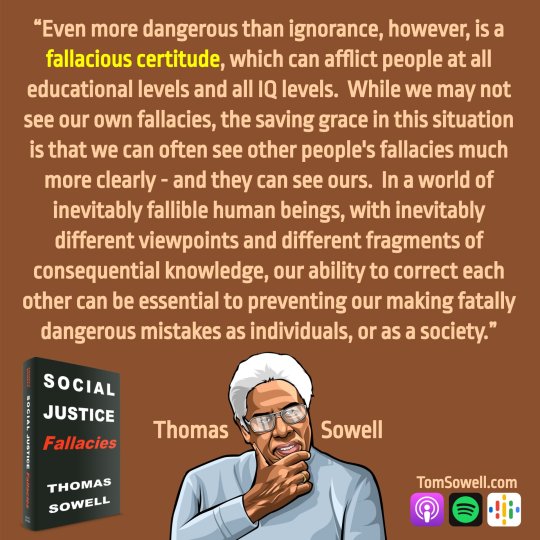
"Even more dangerous than ignorance, however, is a fallacious certitude, which can afflict people at all educational levels and all IQ levels. While we may not see our own fallacies, the saving grace in this situation is taht we can often see other people's fallacies much more clearly - and they can see ours. In a world of inevitably fallible human beings, with inevitably different viewpoints and different fragments of consequential knowledge, our ability to correct each other can be essential to preventing our making fatally dangerous mistakes as individuals, or as a society."
-- Thomas Sowell
#Thomas Sowell#Social Justice Fallacies#illusion of knowledge#dunning kruger#dunning kruger effect#freedom of speech#free speech#religion is a mental illness
47 notes
·
View notes
Text
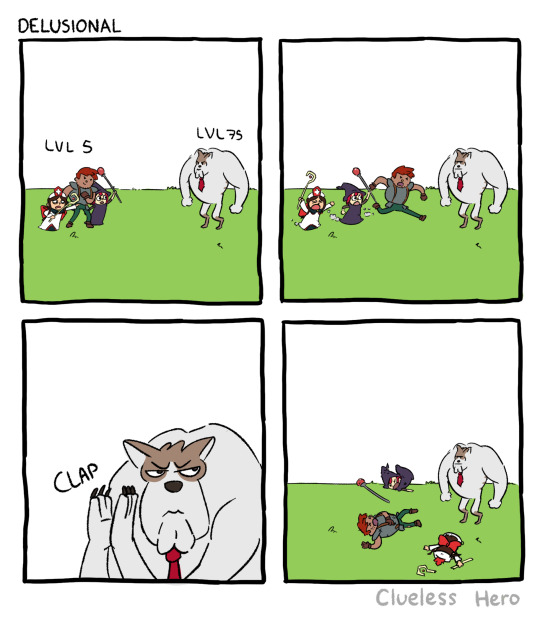
#414 Delusional
Some Dunning-Kruger effect at play right there
Facebook | Instagram | Shop
#Delusional#clueless hero#gaming#videogames#rpgs#jrpg#fire emblem#zelda#dunning kruger#op#overpowered
61 notes
·
View notes
Text
This is where I post from, btw

14 notes
·
View notes
Text
“Not knowing the scope of your own ignorance is part of the human condition. The problem with it is we see it in other people, and we don't see it in ourselves. The first rule of the Dunning–Kruger club is you don't know you're a member of the Dunning–Kruger club.”
— David Dunning
#quote of the day#David Dunning#dunning kruger#dunning kruger effect#quotes#skill#creative#art#artist#NFT#NFT art#NFT artist#ideas#idea#motivation#ignorance#cognitive#confidence#Psychology#mind#Justin Kruger
3 notes
·
View notes
Text
Daily Sermon #117
One of my least favourite things about this world: people treating you like they know you better than you know yourself.
It's happened to me about my autism and my identity as Lamb. I know it's happened to all of my followers at least once. And it's likely happened to you, too.
Seriously, don't be that person. You DON'T know people better than they know themselves, especially if they're a damn stranger.
You don't get to look at someone and say shit like, "you don't have autism because *I* have never seen your symptoms".
There's always more than one side to a story. Everyone's heard "don't judge a book by its cover", but not many people actually follow that advice because they think it's so obvious.
It's easier to judge someone off a glance than you think. And you have no right to do so.
If someone is doing something like faking a mental disorder and you research them and find out it's fake, yeah, call them out on it. But don't just tell everyone who says they have a mental disorder a liar because they MIGHT not be right.
I'm using mental disorders and autism as general examples that I have experience with, by the way, this logic applies to pretty much everything.
Just let people express themselves without instantly jumping in to tell them they don't know who they are.
It's bloody irritating.
#cotl#cult of the lamb#cotl lamb#cult leader#sermon#autism#mental illness#don't judge a book by its cover#like genuinely#dunning kruger
4 notes
·
View notes
Text
Irrational confidence is a poor substitute for intelligence, but it's all that many people have.
4 notes
·
View notes
Note
On the topic of being forced to listen to people who don’t understand game development, in your experience how often does that happen? How common is it and what contexts does it pop up (for example does it happen often when talking with marketing or with a license holder when developing a licensed game)?
It generally happens mostly when we are dealing with decision-makers who aren't part of the industry. You are correct that the most common context are the license holders.

Publishing executives are often less guilty of this than you'd think, they're actually not so far removed that they lack ideas of what it takes to make a game. They might not know the specifics, but they usually have enough context that explaining things to them isn't so difficult. Marketing isn't a big deal either - they often ask for things, but they (typically) cannot force us to do things.

In my experience, the biggest crossover of "don't understand game dev" and "decision-making powers" that game developers are most commonly exposed to are external license owners and their brand managers. These are people who are usually deep experts on the subject material, have almost no understanding of what makes a game fun, and have supreme veto ability on any decision the dev team makes. This can cause all kinds of disruption on the dev team, primarily from unfeasible requirements (e.g. this game should be open world) and overly harsh restrictions (e.g. no, you can't use that key supporting character), but can even range to delays because of minute details (e.g. "[the main character] looks too much like an ape!" regarding our 3D scanned actor model). It's unfortunate, because a bad or extremely picky licensor relationship is like living with a live grenade that might explode at any moment if the dev team cannot secure the license owner's proper sign-off.
[Join us on Discord] and/or [Support us on Patreon]
Got a burning question you want answered?
Short questions: Ask a Game Dev on Twitter
Long questions: Ask a Game Dev on Tumblr
Frequent Questions: The FAQ
36 notes
·
View notes
Text
Baby Boomers
The fact that the word that was used to indicate the post-WWII generation has been repurposed, & now means someone oblivious & antisocial, is proof that the post-WWII generation was consistently showing those traits toward everyone younger & older alike.
The Baby Boomers will be remembered as the Dunning-Kruger effect made manifest as a generation. There was a span of a few decades that didn't realize they'd poisoned themselves. Then that generation were largely so brain-damaged that they tried to kill their own children.
5 notes
·
View notes
Text
Words of the Day
gawp:
To stare stupidly or rudely; to gawk.
Look with amazement; look stupidly.
urchin:
A playful or mischievous youngster; a scamp.
A sea urchin.
A hedgehog.
The Dunning–Kruger effect is a cognitive bias in which people with limited competence in a particular domain overestimate their abilities.
more layman's definition: the tendency of people with low ability in a specific area to give overly positive assessments of this ability. This is often seen as a cognitive bias, i.e. as a systematic tendency to engage in erroneous forms of thinking and judging.
arpeggio: a type of broken chord in which the notes that compose a chord are individually and quickly sounded in a progressive rising or descending order. Arpeggios on keyboard instruments may be called rolled chords.
~~~
'Urchin' is what Noodle was called in Wonka.
Suga spoke about attempting to do an arpeggio at his concert when his guitar string broke.
#Words of the Day#words#dictionary#definitions#vocabulary#wonka#noodle#arpeggio#bts#bangtan#suga#dunning kruger#dunning kruger effect#gawp#urchin
2 notes
·
View notes
Text
The vast majority of civilian government employees that are military vets suffer from the Dunning-Krueger Effect.
2 notes
·
View notes
Text
Lucy's Side Quest #5: Manic Drawing session
Big reveal: I'm Merch Chair of my dance team this year! Yayyy!!!
So I feel really lucky to have fallen into this position because the only experience I actually have designing a shirt is once for a club in high school. BUT my confidence in making a banger clothing line is so high. It's giving Dunning-Kruger effect (i.e. where those who have the least experience/knowledge of something have the most ginimonosaurus un-based confidence in their capability). Speaking of, idk why I'm explaining psychology to a bunch of 6-9's and 9.00 fans.
Anyways, I'm back at home because I'm trynna become an american this week and taking the civic exam here in Dallas. There's never anything to do in Texas, because it's so hot outside and my siblings are internet queens, so I just drew a bunch.



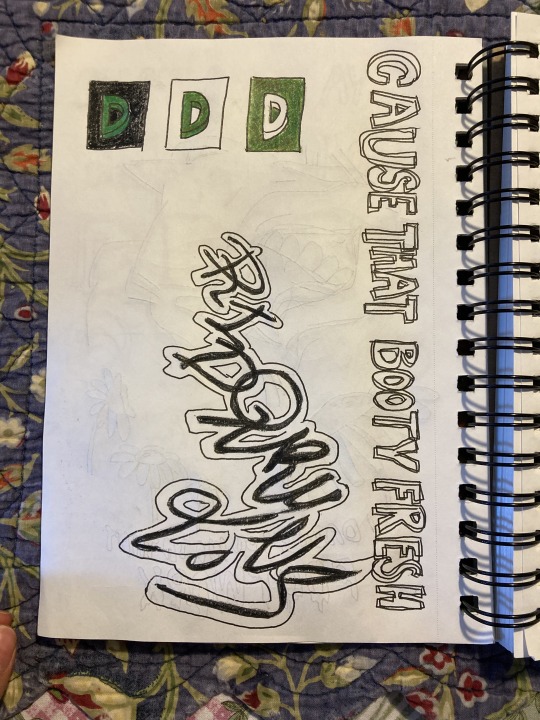
Even if it looks silly now, I have this vision of how these designs could look nice mix-matched on t-shirts, hoodies, or sweatpants. Some of the font inspiration is from Tyler the Creator's albums, and in general his Golf Wang brand. I probably should have waited till I created digital versions to post this, but I couldn't wait to share it. I'm a hoe for instant gratification.
This is another drawing to break in this sketchbook. I haven't used colored pencils to art in a hot minute. Like at least 8 years, holy shit.

I really don't know where I'm going with art. I listened in on the Figma design conference last week, and really thought hard about this 6-3 degree I'm gunning towards. I really want to. Need to. Do something creative in my job. I might go crazy otherwise. Not necessarily design, or dance, or music, or drawing, or writing. I don't know what, which is the problem. Do I just start making hella shirts and portfolios? I might actually start that Youtube channel.
It would be nice to have a mentor/advisor in media, and there must be so many at MIT... just how to reach the right ones?
#actual ihouse art#merchandise design#dance team#dunning kruger#art#artists on tumblr#golf wang#fashion#lucys side quest
13 notes
·
View notes
Text
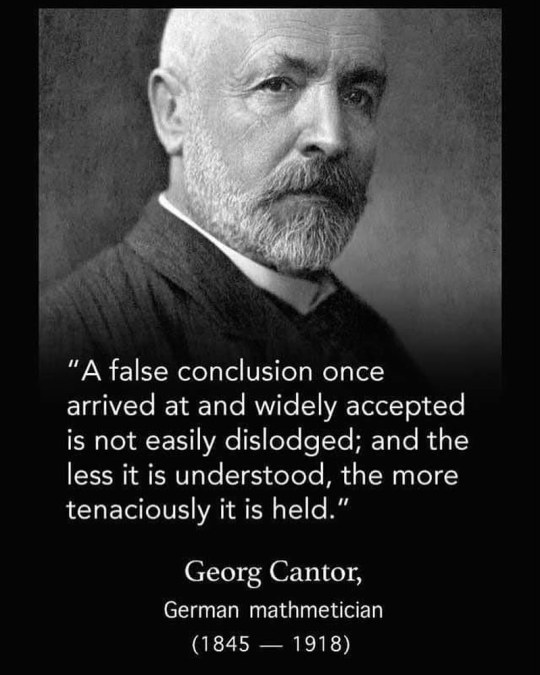
"A false conclusion once arrived at and widely accepted is not easily dislodge; and the less it is understood, the more tenaciously it is held."
-- Georg Cantor, German mathematician (1845-1918)
#Georg Cantor#Dunning Kruger#Dunning Kruger effect#ignorance#false conclusions#religion is a mental illness
22 notes
·
View notes
Text
One of the weirder hot takes you get from grammar prescriptivists is that reinforcing double negatives ("you didn't see nothing") are somehow inherently incorrect or a sign of stupidity.
Incoming: a short rant about linguistic prescriptivism and then an excerpt from the Canterbury Tales.
Firstly, there are more languages than English, and in many of them it is the norm that negatives reinforce, rather than cancel each other out. You might say "yeah but not in English," but you're objectively wrong. Several dialects and sociolects of English use reinforcing double negatives, it's just that you're dismissing the people who use them as either stupid, non-fluent, or both (the idea that a well functioning adult could lack fluency in their own native language is preposterous by the way). The racial dimension is too obvious to even be worth diving into.
However, I think the thing that annoys me the most is the resounding ignorance and arrogance of the people who think like this. Sure, the part where you assume that every language and every dialect follows the same grammatical rules as your own is a common enough mistake, but the irony is that by insisting on this, you're showing your own ignorance of the language with a gesture intended to signal your superior grasp of it.
The average linguistic prescriptivist is in my experience not very well educated in language, not its formal rules, not the scientific study of it, and certainly not with its literature. They tend to occupy the "knows enough to think they know something, but not enough to realize how little they know" section of the Dunning-Kruger curve.
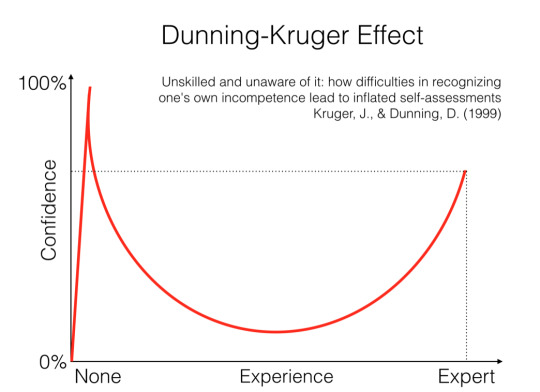
Note that this graph is a simple representation of an idea, not the result of a study or anything like that. The numbers and relative positions here are made up. That's how the curve manages to slope back in on itself after the peak.
What I mean is, they tend to know enough to be moderately aware of the formal rules of "standard" English, without any grasp of the real nature of a language (usually conceiving of it as some kind of ideal object that can be "correctly matched with" in an objective way), and even more damning, without a lot of experience actually engaging with that language beyond speech and simple text.
At best, they know some factoids from high school about how you're not supposed to end a sentence with a preposition (it's fine, actually, English is a Germanic language which means it loves shifting word order around) and such.
Anyway, here's a quadruple negative used in a reinforcing manner by Geoffrey Chaucer, arguably the founder of English-language literature, while describing the knight character in the prologue to the Canterbury Tales. A genuinely good writer that, along with Shakespeare and many others, one must presume that these prescriptivists have never read, at least not closely, though they in my experience tend to pretend they have.
At mortal batailes hadde he been fiftene,
And foughten for our faith at Tramissene
In listes thries and ay slain his fo.
This ilke worthy Knight hadde been also
Sometime with the lord of Palatye
Again another hethen in Turkye;
And everemore he hadde a soverein pris.
And though that he were worthy, he was wis,
And of his port as meeke as is a maide.
He nevere yit no vilainye ne saide
In al his lif unto no manere wight:
He was a verray, parfit, gentil knight.
Or, if your Middle English is rusty, here's my rough translation:
He had been at fifteen tournaments to the death
And he had fought for our faith at Tramissene (Tlemcen, Algeria)
In three lists (tournament grounds) and always slain his foe.
This same worthy knight had also been
Some time with the lord of Palatye (the Emir of Balat, Turkey)
Against another heathen in Turkey;
And evermore he had a superior reputation.
And he was every bit as wise as he was bold.
And his demeanor: as meek as a maid.
He never yet no rude thing hadn't said
In all his life to no kind of person:
He was a true, perfect, noble knight.
Anyway, in conclusion, prescriptivists shut the fuck up.
#takes#mini essay#history#linguistics#politics#poetry#geoffrey chaucer#dunning kruger#canterbury tales
6 notes
·
View notes